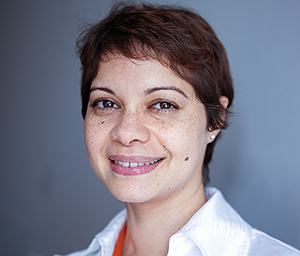Janelle Babb
Question: How can we change social norms to prevent violence against women and girls (VAWG)?
“An important ingredient in changing social norms is what young people learn and how early their learn it. Inequality is structured around power dynamics and traditions and cultural expressions and experiences that young people are exposed to when growing up.”
“Education has an important role in helping young people to question and reflect on what they see and what they experience as gender norms and social norms and how those norms influence their concept of themselves and the relationships that they have with others. So by strengthening how education can shape those conversations and the reflections that young people face, it will go a long way in transforming behaviours, attitudes and values for more equitable relationships that are free from violence.”
Question: Could you share with us a success story on social norm change that has contributed to end VAWG?
“There is a lot of work happening in communities. UNESCO does not deliver programmes, but we do work with a lot of partners that help deliver programmes. Part of the issue is how we monitor and evaluate what a successful programme is. We do have a lot of good examples of life skills-based education, where young people have been equipped with negotiation skills, and critical thinking skills, leading to an improved school environment, fewer incidences of school fights and violence, and more harmonious relationships. So those are the kind of things we see coming from the field.”
“But really right now, the education system in many countries is not set up to evaluate those kind of qualitative outcomes in behaviours. Usually, quite honestly, the outcome manifests long after young people leave school. Sometimes it comes very early and sometimes we cannot definitely say, yes this is the result of this kind of intervention.”
Question: What would you suggest to policy-makers to advance ending VAWG?
“The actual role of policymakers is creating the structures that will inform change. So we start with the evidence. What is happening in my situation, my school situation, my community, my country’s situation? What is working well, what are the incidents and experiences on violence against young people and women? Then based on the specific situation, we craft a response and we do that in a participatory way. Then as a policymaker, it is my role to convene among my stakeholders. If it’s in education, then it is education policy-planners, teachers, and the voices of young people themselves who have experiences violence in every expression who have experienced violence in divers forms, and then from that, through dialogue, you shape policy and from policy move to programme action that is well-resourced, that comes with vocal advocacy in support of the issue, because this is also the role of leadership, and then making the resources available for those actions to be implemented.”
Question: Could you give me a call for action in one line?
“There are 16 points actually. This is part of the advocacy around gender-based violence which is ongoing; 16 Days only come once a year. Let’s make every day a day for activism to end VAWG.”
About the expert
Janelle Babb
Position: Programme Officer at UNESCO in Paris
